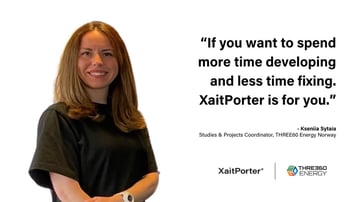Before you dive headfirst into the readily available AI options, let’s take a step back. This blog explores two popular proposal writing models, the pros and the cons, and how to avoid the dangers of proposal writing with AI.
What is Artificial Intelligence (AI) for Proposal Writing?
AI promises a future of instant gratification and automated proposal writing. But what exactly is AI in this context? Here’s a breakdown of the different AI models impacting the industry:
- Discriminatory AI. Designed to identify specific information from a large selection of secure, closed-system data. It swiftly sifts through data to extract the most relevant information.
- Generative AI. Designed to generate text, images, videos and other data based on a large selection of typically external data. It swiftly learns patterns and structures to generate content.
Proposal Writing with AI Benefits
Your proposal team leverages a mountain of big data to write. Searching and sifting through that data is a monumental task. Today's AI software is transforming that mountain into faster, actionable insights.
- Faster Bid Decisions. Analyze Tenders, RFPs and RFIs faster than human eyes and brains. Sift through mountains of requirements and quickly identify red flags based on “go/no go” criteria.
- Boost Quality. Quickly sift through the mountain of past proposals and reusable content. Find that relevant needle in the haystack faster.
- Boost Creativity. Brainstorm and eliminate blank page paralysis. Unlock new ways to showcase your value proposition.
- Streamline Workflow. Accelerate the proposal process. Free up time for more productive reviews and the strategic aspects of persuasive proposal writing.
Suggested content



AI Writing Dangers
There’s no denying AI software’s potential to revolutionize how we write proposals. It can also, however, introduce risks. Risks that can negatively impact your credibility and professionalism as well as your business.
- Data Privacy and Security. Many publicly available AI models will use data to further train, making you susceptible to information leaking. Enter your data and it could be used for future training models.
- Plagiarism Concerns. AI leveraging the world wide web exacerbates the risk. Many closed source, commercial models are not forthcoming with what their data is trained on. Results range from legal landmines to accidentally submitting previously submitted material.
- Incorrect Content. Generative AI can misunderstand requirements and omit information. They can also make up fake products, people and events - called hallucinations. Just how generative AI's arrive at their content outputs remains a black box.
- Non-Uniformity. RFPs, RFIs and Tenders are not exactly straightforward. Generative AI can miss critical context because it is mostly trained on public data patterns.
- Bias. If public data contains bias, generative AI will mimic and produce it in its output. One generative AI began sharing racist, transphobic and antisemitic posts within 24 hours of going live.
Tools for Proposal Writing with AI
Responsible use of AI writing tools alleviates these concerns and minimizes the risks. By taking a measured approach to AI writing tools, you can still realize significant benefits. Without falling prey to security and legal pitfalls.
Be Human
AI’s true value lies in augmenting your skills, not replacing them. Remember the human element remains. Focus your AI goals on the results the humans evaluating your proposal are looking for.
- Critical Thinking. Humans excel at understanding the nuances of complex client needs. Winning proposals strike a balance between your analytical power and your critical thinking super power.
- Human Touch. The human touch breathes life into your proposal. Winning proposals showcase your understanding, empathy and strategic insights as well as your technical responses.
- Quality Content. Humans elevate proposals from good to great. Winning proposals demonstrate critical thinking and creative problem-solving.
Take an Iterative Approach
Begin with a discriminatory AI software that builds a reliable corpus of approved content. This will instill confidence in both your AI tool and your proposal writers. And avoid the security, legal and bias issues.
- Analyze RFPs Faster. Discriminative AI analyzes your RFs and Tenders. It expedites the right information to the right experts based on your criteria. So you can focus on the decision.
- Accelerate Writing. Experts waste an average of 2.5 hours per day searching for information (IDC). Discriminative AI suggestions deliver relevant results faster so you can focus on tailoring content.
- Control Security. In light of the trust and security concerns, businesses are focusing on using their own secure, closed-system data. This delivers efficiencies without sacrificing security.
- Reduce Start-up Time. Discriminative AI relies on data context based on usage, not tagging. This significantly reduces start-up and maintenance time.
Evolve Over Time
As generative AI evolves, and addresses the risks, explore carefully. Use your critical thinking skills to manage and apply its outputs to your proposal writing. And jealously guard your data with the strength of Fort Knox.
- Overcome Writer’s Block. Generative AI can suggest unexpected ideas, creative phrasing and new angles for tackling the same old content.
- Expanding Content Options. It can propose diverse options for different sections and fresh perspectives and variations on the same old content.
- Initial Drafts. It can also generate drafts based, jumpstarting the writing process. Just remember, whatever it creates for you, it's up to your critical thinking skills to assess, curate, and refine.
- Consistency. It can also help clear up language, ensure consistency across the proposal and increate the overall quality of the written word.
Discriminative AI Impact
Discriminative AI is today’s go-to choice for proposal writing requiring factual accuracy and efficiency. Industry research demonstrates:
- 30 - 50% reduction in errors and less time spent fixing mistakes (Forrester)
- Automate nearly 64% of data collection tasks (Forbes)
- 20 - 40% reduction in research and information gathering (Forrester)
How is XaitAI accelerating proposal writing with a discriminative AI approach?
- Getting the right information to the right experts faster
- Expedites bid discussion and decision
- Reduced effort for complex proposals
Ready to Securely Write with AI?
Harness the power of discriminative AI to:
- Work smarter without compromising security
- Write faster without bias and legal issues
- Deliver more without putting your business at risk
The world of proposals stands at a cross-roads. AI software presents a powerful new tool, but it's crucial to remember it's an assistant, not a replacement for human expertise. Remember, the winning formula lies in striking a balance of benefits and risks. Not in compromising security and quality.









